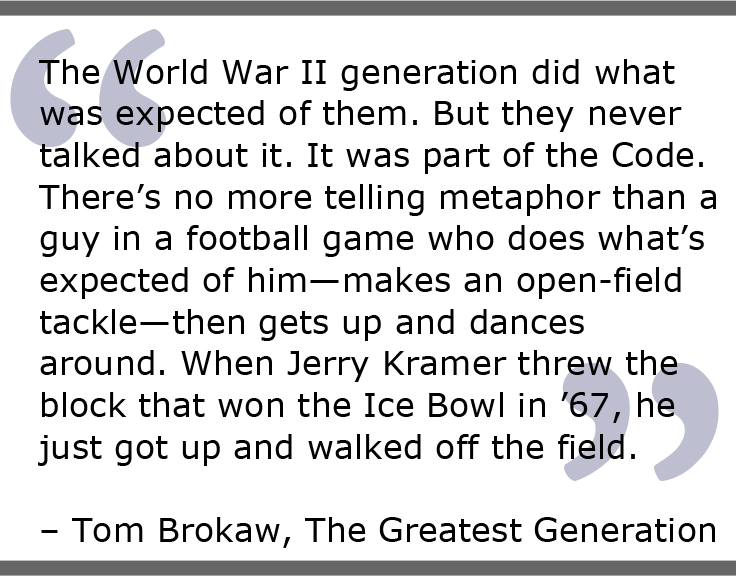This blog entry is part four in Jacobson’s Generational Spotlight Series, which provides a general overview of the generations active in the workforce. While we understand that these overviews may include broad stereotypes that do not apply to all members of that particular generational breakdown, we believe there is value in looking at today’s professionals from a generational perspective in order to gain a better understanding of their viewpoints.
 More commonly known as “The Greatest Generation,” the Traditionalists are a driving force in today’s workplace with seven million individuals currently employed in the United States. While smaller than the other generations, this still represents nearly five percent of the U.S. workforce. Playing a key role in forming the business world of today, these tenured individuals are a great source of perspective, knowledge and institutional wisdom.
More commonly known as “The Greatest Generation,” the Traditionalists are a driving force in today’s workplace with seven million individuals currently employed in the United States. While smaller than the other generations, this still represents nearly five percent of the U.S. workforce. Playing a key role in forming the business world of today, these tenured individuals are a great source of perspective, knowledge and institutional wisdom.
Born before 1945, the Traditionalists grew up in the wake of the “Great Depression” and in the era of nuclear families and strict discipline. World War II was the pivotal event of their lives. War heroes were celebrated upon homecoming; and overall, the nation was marked by a strong sense of commitment to families, soldiers, country, and community.
Having imparted their values and work ethic into current workplace policies and procedures, the Traditionalists are expected to influence the business world for decades. What can your organization do to capitalize on this immense source of business insights?
 Often conservative and “old-fashioned,” this generation follows the rules, has extreme discipline and highly respects authority figures. They are accustomed to a direct style of leadership and prefer organizations with a hierarchical structure. Workplace communication and requests should be direct, face-to-face and personalized. Traditionalists are motivated by projects and tasks that relate to the overall benefit of the organization. Managers and supervisors should identify clear goals and direction when assigning tasks and connect projects to the larger picture.
Often conservative and “old-fashioned,” this generation follows the rules, has extreme discipline and highly respects authority figures. They are accustomed to a direct style of leadership and prefer organizations with a hierarchical structure. Workplace communication and requests should be direct, face-to-face and personalized. Traditionalists are motivated by projects and tasks that relate to the overall benefit of the organization. Managers and supervisors should identify clear goals and direction when assigning tasks and connect projects to the larger picture.
Traditionalists view work as a privilege. They have reached the upper echelons of the business world and continue to work because they want to. Organizations looking to hold on to these professionals should provide ample opportunities for flexible work. Part-time schedules, contract and temporary work offer these experienced professionals the ability to choose when and what kind of work they will do.
The most engaged segment of today’s workforce, Traditionalists are invaluable employees. Their experience and perspectives are a great resource for an organization. These employees should be encouraged to capitalize on their experience and participate in two-way mentoring relationships with their younger counterparts. Organizations may also want to engage these individuals through committees and advisory roles that will enable them to share their hard-earned wisdom.
Today’s Traditionalist professionals offer a wealth of knowledge and insider observations that can be very valuable to any organization. With their perspectives and practices expected to shape the business world long after they have retired, cultivating this generation is key. How is your organization reaching out and engaging its tenured, Traditionalist employees?